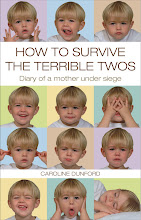Yes, I know this is quite normal. I already have an older son and he didn't talk as a baby either. In fact, long before he emerged onto the scene I knew, like the rest of you, that babies don't talk. However, when you're confronted with the reality of caring for a tiny human, who does interact, but without words - and you spend most of your life using words, it is a bit of a shock. Not least because so much is 'said' without words. You end up having _years_ of conversations in which one party communicates entirely non verbally.
There were several positive side-effects during my son's first year. Characters in my writing started moving more, demonstrating by action as well as with words their intent. This new take on communication helped even more when I was writing stage plays. Because of how my baby and I were communicating I become much more in tune and more cognizant of how physical communication between actors can work on stage.
And when he started to talk - number 1 son is now six - I found and still find that I have to be very clear with my directions and I am frequently called upon to define new words. I am of the school of thought that you talk to children as you would to an adult rather than in doggy-woggy terms. (This does pay off. When asked about his favorite animal my son replied without hesitation 'a chameleon' because of its 'natural ability in camouflage'. He was three and a half at the time.)
Effectively all mothers teach their offspring language from scratch. It's quite a duty and if you're going to do it well you need to develop the ability to be an exhaustless and accurate, walking thesaurus. It makes you think very carefully about your use of language.
Now, I'm back again in babyland I'm finding my writing is again becoming more physical and it is all the fresher for it. As for the fact I'm having one-sided conversations most days, I've always both read and plotted aloud when I'm checking out ideas and difficult passages. It's rather nice to have a constant critic, whose worst remark is 'goo' and will smile even at the most tortuous of prose.







No comments:
Post a Comment